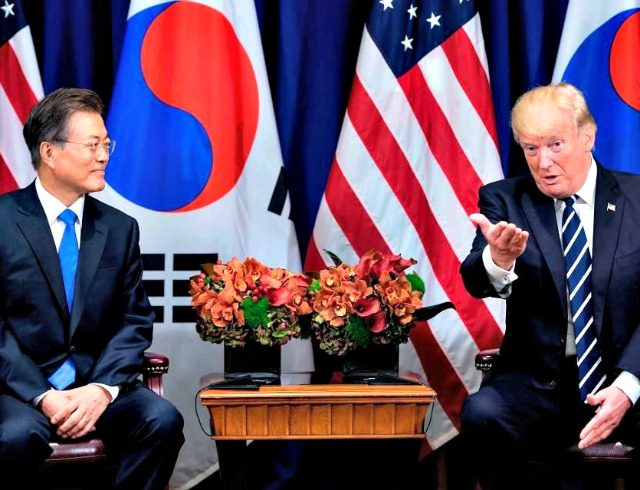U.S. and South Korea Reach ‘Innovative’ Trade Deal Touted as Roadmap for Future Deals

Brendan Smialowski/AFP/Getty Images
Renegotiation of the KORUS trade deal between the United States and South Korea has been accomplished “in principle,” according to senior administration officials who hailed the “visionary and innovative” agreement as one that may inform future deals.
“This is both a good deal for both countries and a very big deal in the history of U.S. trade negotiations,” said one senior administration official who called the agreement “visionary and innovative.”
Details of the deal were communicated to reporters in a Tuesday evening phone briefing.
One of the officials said that this deal “underscores a pattern of failure by previous administrations to negotiate fair and reciprocal trade deals that benefit both countries.”
President Donald Trump directed the U.S. Trade Representative (USTR) to renegotiate the deal. USTR did so in coordination with other U.S. agencies.
Officials hailed the new deal as a “big win for American companies and American workers.”
The KORUS trade agreement between the two countries was negotiated under the George W. Bush administration but did not have enough support from Congress and stakeholders at the time. After some renegotiation under the Obama administration, the deal finally had enough support to go into effect in March 2012. Trump officials described the result of the deal as not performing as expected and even in some cases “disastrous.”
One of the biggest problems under KORUS has been U.S. automobile exports. Roughly 80 percent of the trade deficit in goods with South Korea is attributable to autos and auto parts, according to the officials, one of whom identified autos and trucks as a “core driver of the deficit.”
Under the new deal negotiated by the Trump administration, the U.S. will extend a 25 percent tariff on imports of pickup trucks to the U.S. until the year 2041. This is a “big win for U.S. truck producers and the workers,” said one of the officials. Over the past five to six years of the KORUS agreement, U.S. exports of automobiles to South Korea, those built to U.S. safety standards, were capped at 25,000 per manufacturer, per year. An official said this created an economies of scale problem. Under the new agreement, that cap has been raised to 50,000.
The new agreement also reduces some of South Korea’s regulatory burdens to trade of automobiles and auto parts as well as some labeling regulations. One official said the changes will “create a suite of outcomes that are going to make it a lot easier for our auto companies to compete on a level playing field there in Korea.”
There will also be changes to emissions standards in South Korea that will take U.S. regulations into account.
Implementation issues associated with KORUS will also be improved. Inspections at the South Korean border have sometimes been “burdensome” and “arbitrary” for the country of origin, according to one official who said this has applied to not only automobiles, but also to agricultural and other products. This issue is being mitigated in the agreement. A working group will oversee, monitor, and address these issues.
South Korea will also open up the opportunity for the country’s pharmaceutical reimbursements for innovative drugs to U.S. companies under the new agreement. These premium payments have previously only been available to the South Korean companies.
One official announced what was declared a first of its kind currency agreement as a side deal to the trade deal. The U.S. Department of Treasury has been conducting negotiations with Korea’s Ministry of Strategy and Finance on “robust provisions that will: 1 – prevent competitive devaluation of currency, and 2 – ensure that there are commitments on transparency and accountability to make sure that countries know what others are doing with respect to monetary policy.”
In response to new U.S. tariffs on aluminum and steel, the two countries negotiated a compromise on steel tariffs. U.S. tariffs on imports of aluminum will remain at the 10 percent imposed. Steel, however, will face a hard annual quota instead of the 25 percent tariff. South Korean exports to the U.S. of steel will be limited to “70% of the average annual export volume for these steel products based on a three-year average for 2015-2017.” This will cause an approximate 30 percent reduction in steel imports from Korea to the U.S., said the official, who called it a “huge win.”
One official declared that “the President was correct to undertake this renegotiation. He was able to make it a better deal and win concessions that should have been won before and to take advantage of … to create and take advantage of leverage in this situation in a way that helps U.S. workers and businesses.”
The deal was hailed by the officials as innovative and visionary and one that may inform future negotiations as they arise.
Follow Michelle Moons on Twitter @MichelleDiana





Comments are closed.